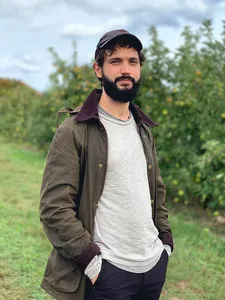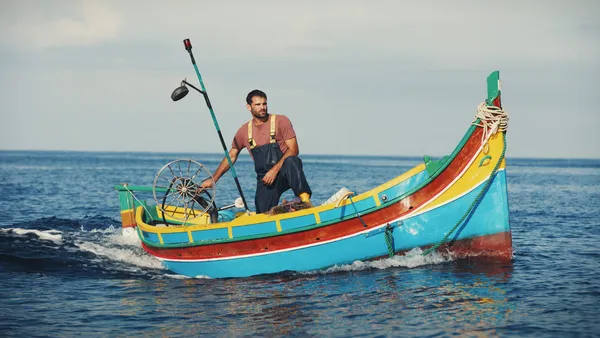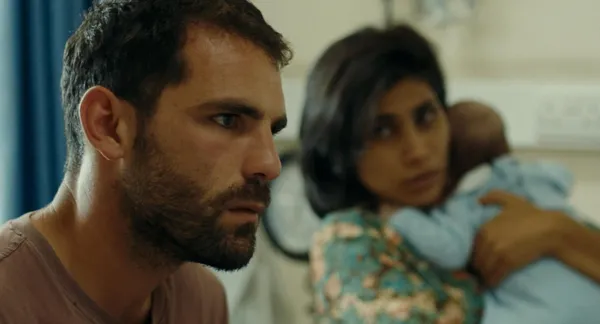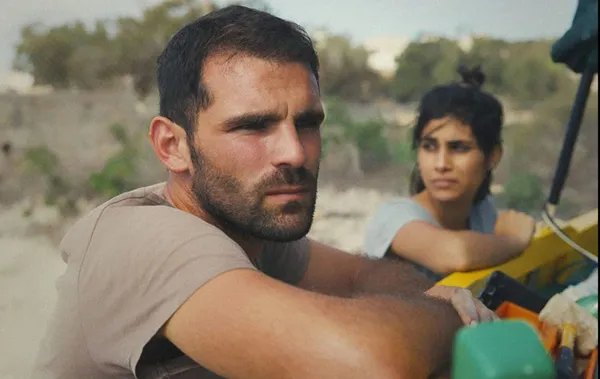Director Alex Camilleri's debut, Luzzu, is a neorealist drama about a fisherman (Jesmark Scicluna), who is facing choices about his family's fishing tradition on their luzzu boat after the birth of his son. The film - shot in Marsaxlokk in Malta - blends non-professional and professional actors and is a gripping and heartfelt consideration of the changing way of life on the island as the fishermen face the realities of commercial fishing, the changing face of the European Union and black market activity. Proving that non-professional actors can be every bit as good as those who are trained for the role, Scicluna won the Acting Award at Sundance, where the film had its world premiere. We caught up with Camilleri via Zoom to talk about his Maltese heritage, the challenges of the film and his plans for the future.
How did you decide to tell the story in the first place – Malta is not exactly known for its burgeoning film industry?
Alex Camilleri: It’s a very personal film, because it comes out of my connection to the island. My parents are Maltese. They emigrated to the States, in the late 80s. I was born here, and, and we tried to get back to Malta as often as we could and keep close ties there. And so my kind of life has been a bit of coming and going and wondering a bit about my connection to my own heritage, and trying to make some sense of it and my place in the world.
I didn't know anything about fishing, and honestly, never even been fishing in my life. But I was just curious about this world of fisherman, because looking at it from afar, it seems so steeped in a kind of beauty and tradition, it made me want to learn more. When I started talking to fishermen, I realised that those things that I'd wonder about in my own life – about how I related to my past and what my future would be – they were really thinking along the same lines.
And while they were thinking about the same things, but almost running in the opposite direction. I spoke to so many fishermen who were determined that their children would not inherit the same fate. And that seems so profoundly sad. But at the same time, they were communicating it without any sense of sentimentality. And I could tell that there was this enormous kind of heartbreak beneath the surface, that sort of this legacy and this heritage was meeting its last generation, and there was really nothing that they could do about it. And they were just so surprisingly clear eyed about it. It seemed rife with the potential for a dramatic story.
 |
| Alex Camilleri: 'It’s a very personal film, because it comes out of my connection to the island' Photo: Lori Keong |
Can you talk a bit about your decision to cast non-professionals?
AC: That instinct came very early on, and it's, it's part of a tradition in cinema that goes back many decades. Part of it is an aesthetic choice and artistic choice, about style of performance, but more than that, it's an ethical approach. In that, if you are telling stories about ordinary people, I think that those people who you are portraying should have some agency and involvement in representing themselves.
I was indebted to Italian neorealist films. When I discovered them as a university student, they left a big impact. But it was also a tradition that was taken up by my filmmaking mentor, an Iranian American director named Ramin Bahrani, who is also a producer on this film. So, on a nuts and bolts level, I just I'd seen up close how those kinds of performances worked, and how to direct them and how to shoot them. And I just love them. I think that they inject the film with a kind of energy that elevates them beyond being normal works of cinema, because they're bringing to the role not just their life, but their whole family's histories, lives and those things break through the edges of the frame. And I think the audience can feel it.
The scene with a group of fishermen talking about the industry has a very documentary feel to it. Did you basically just go and sort of kind of almost be a fly on the wall in those situations? Or were you guiding them as to what you want them to talk about? How does that work?
AC:It's a bit of both. I also have experience in documentary and it was an opportunity for me to kind of let some slack into the rope and have a kind of a looser scene. If you can thread those things into the film and put them in the right place, you keep the audience feeling like anything can happen, because this is not just a film and where there's a script. In that particular scene, I had kind of three topics that I thought would be interesting. And these were all culled from my research. Immediately, when I suggested to them, like, ‘Oh, you could talk about someone who had who had a run in with smuggling’, they filled in the details and then they brought their own their own life's experience. And so that's it. So I'm not sure where the line is between fiction and reality? I can't even tell in those scenes.
Are there challenges in marrying non-professional performances with professional ones?
AC:I didn't really have a lot of challenges and I think if you ask the trained actors on this film, they would say that the non-professionals made them better. Jesmark’s performance is so subtle. It's amazingly soulful, he had a soulfulness that just came through. You can read it in his eyes, and he doesn't have to do very much. The cameras going to pick it up. And when people saw how he was moving and speaking and behaving on onset, people came to his level. I think the non-professionals elevated not just the other actors, but made me a better director too, I'm watching more carefully. I'm not getting kind of distracted by histrionics or pyrotechnics or whatever, I've got a lot watch the monitor - is it emotionally truthful? What is their body doing? And what are we getting visually that’s going to speak beyond language?
It’s also interesting that you've incorporated the character who isn't Maltese at all. Uday is a sort of an itinerant fisherman to a degree, living from his boat. Was that something that you came across in research? How did you sort of decide to incorporate that element?
And so glad you asked. It's in the film, because I've, like many of us, seen what's happening in the Mediterranean and have been very interested in migration, in Malta always has a very interesting place in that because it's between continents. And, what's been happening, let's say, for the last 15 or 20 years, between sub-Saharan Africa and Europe - Malta has been right smack in the middle of that. I wanted a character who was an outsider, who could help just mark change. And it was a way for me to show the modern face of Malta. I assumed that it would be an African character but when I got down on the ground and really started to kind of writing and researching, circa 2017 2018, what immigration in Malta was in 2018, was a lot of South Asian, Indonesian guys working on boats. The immigrant character wasn't the sub-Saharan African guy.
That excited me because I thought it was going to surprise people - and not just surprise people at Sundance - it was going to surprise people in Malta, I would go down to the harbours and meet these Indonesian guys and film them and shoot little documentaries. And I would bring them back, to friends or my filmmaking team on the other side of the island, they’d be like, ‘Where the hell? Why are these Indonesian and South Asian guys here?’ They had no idea what's happening. So it's nice to be able to surprise people.
How was shooting on the boats – was it easier because the men knew what they were doing?
AC:It's all the more reason to work with non-actors. It’s 1000 times easier to train a fisherman to be an actor than to train an actor to be a fisherman. I laugh to myself, because there's a scene and you'll know it later on in the film, where the two fishermen get onto the wooden luzzu. And they go for a ride and it's a bright, sunny day. They just they stepped from the shore onto the boat, it seems like the simplest thing, the way that those looters are shaped, anyone else who sees this film of we just tried to do that little manoeuvre of just stepping on to the luzzu, we'd be in the water in a second. So that's just a painted picture about the physical requirements of the role. But it was very difficult to shoot at sea. There’s no denying it, everyone says it's a nightmare and they're right. It is. There's the famous book about Jaws about what a terrible production it was, and how awful it is. And I hadn't read it, and were telling me to read this book, and I said, ‘Never in a million years am I'm going to read that book before I go and do it’.
I relied on the expertise of my amazing crew, and tried for a little while to pretend like I didn't get as seasick as I did, but you cannot deny your own nature. And I got very sick and, and there's a scene in the middle of the film, we shot it at night, it's where they do a kind of black market expedition. And things started out okay, but we're on a big kind of industrial boat this time, and it's just spewing diesel, and the fumes of that are hitting your face. Plus this really high swell. Uday started to get kind of sick, so he took a break and I stepped into read off-camera for Jesmark. And I was saying the lines… then I started to forget the lines, maybe because of the diesel fumes, and then I started reading off the script. And the minute I started reading, I just lost it. And I became really, really sick. And for the rest of the night, I was having my director monitor like this [he mimes holding the monitor low], I would throw up over the boat. We had no opportunity to reshoot any of this stuff.
I really have to credit Uday. We almost turned back to shore. I mean, we're just going to try to figure out how to fake it, and just go home with our tail between our legs. And then I don't know what happened, but like a bolt of electricity went through Uday and he just started performing the second half of the sequence, which is where he starts instructing Jesmark about how this operation works. Yeah, it's such energy. He inspired us - like the seasickness left our bodies, miraculously. And we just picked up our equipment, and then started shooting. It's still a miracle to me.
How was it having Ramin as a mentor, given that he has done this sort of thing before and it has worked really well for him. Was that something you could draw on?
AC: Oh, yeah. And, and almost every stage, he was there. Most importantly, at the script phase, because writing these scripts is kind of tricky, because you can't overwrite them but you still have to get out what you want to say - there's still things you wanted to happen in the film, I didn't want to make just like an atmosphere film.
It’s quite a complex to plot, especially concerning the black market, there's quite a lot of beats you need to hit.
AC: That's right. And, and finding that balance was the key challenge at the script phase. But Ramin, had been through it. And he how to kind of write for non-actors. And then he looks at casting tapes with me and then when it came time to edit he would look at cuts with me. I will say, though in a way I'm grateful for it now, I was a little afraid at the time, pre-production and production, Ramin was in India shooting The White Tiger. So I couldn't call him and be like, ‘Ah, I can't figure out the coverage for the scene or whatever, can you help me?’ It was sink or swim at that point. And looking back now, I'm kind of glad because it reaffirms the things that I was able to figure out by myself. Maybe it's the best of all possible worlds, in a way, in the sense that you have some support network, but on the other hand, you've done it yourself. So at least you can feel like it's mine, and I did, which is great.
Did it help you that, although your heritage is Maltese, you are not from there in the sense of growing up on the island. Do you think having a sort of one foot in the camp one foot out of the camp was helpful?
AC:I think so. On a profound level, and perhaps goes deeper than you're even asking, because my status, I think, enabled this film to happen in a way that it might not have happened otherwise. I'd wondered about my position, being somewhat of an outsider. And whether I understood this world well enough to tell it. I knew I could do any amount of research, and I certainly did, but I wondered whether I was just the right person to do it. And there were certain people along the way, who tried to whisper in my ear that I shouldn't do it. You can't listen to those people, of course, and you need to just plough ahead and, and follow your vision.
 |
| Alex Camilleri: 'It’s 1000 times easier to train a fisherman to be an actor than to train an actor to be a fisherman.' Photo: Courtesy of Sundance Institute/Inigo Taylor |
But it was really only at the end of filming that I was told something that changed my whole perspective on this question. The wife of one of the fishermen came up to me, and said, ‘It’s amazing what you accomplished, and what you got out of the fishermen. And I want you to know that they opened up to you in a way that they never would have, if you were fully Maltese’. They felt some licence because I was from somewhere else. And the way that sometimes we take comfort in strangers, we have less inhibition.
That was moment I realised that the thing that I'd worried about, that I thought might be holding me back this whole time, actually kind of liberated me, and liberated the film. And that was an edifying experience, and in a way ties to maybe something that Jesmark is going through in the film, which is, he's worried about whether he's going to pass on something that's kind of a curse to his son, and he wants his son to be better than him in a way. But he has to kind of redefine himself in a way to not feel that way, he has to have a new definition of what it means to be a father what it means to impart something to his child. I don't want to exaggerate the similarities between maybe having a film and having a child but I can't help but make these connections and going through it as the only way that you, you can really experience these things.
What is next for you, because obviously this film is quite personal to you because of the Maltese connection. Are you thinking of more neorealism, stories from America?
AC: Well, I'm working on my next film right now. It's back in Malta. And I really like working this way. The experience that we had on this film was so good, and people are responding to this film, that I'm just all the more excited to do it again - but in a completely different world. I’m working again, with non-actors and blending in some trained actors, but showing another side of Malta that people have never seen before, and doing it in a different tone, a completely different emotional register with different kinds of characters, and it's something that I think will really surprise people. So I think that the methods are going to be similar to this film, but I hope it's showing a different side of my personality and kind of carving out yet kind of more space for the types of films that I can make.
I guess the pandemic is going to be throwing a bit of a spanner in the works?
AC:I mean, I would be in Malta right now, I would be casting and researching at this moment, I have a draft of the script that I like, and I'll keep working on the script, but it's like you need to cast and then you need to write based on the casting. So we're all dealing with these setbacks big and small. We'll get we'll get through it. And I'm looking forward to this project, because it's, in a way also about people coming together and being in rooms together.
Luzzu will have award winners screenings today (Feb 3) at Sundance, on demand, starting at 3pm


























